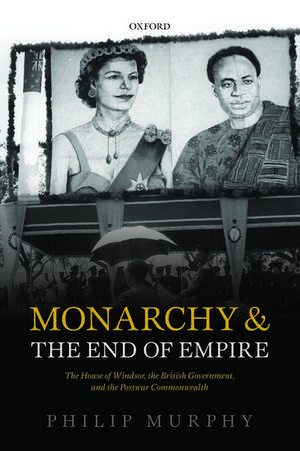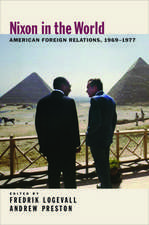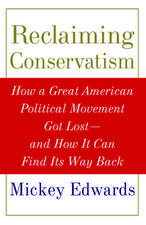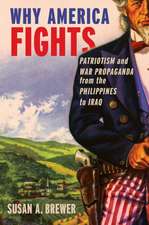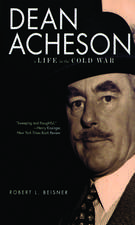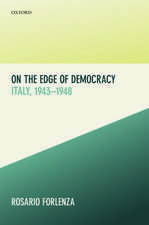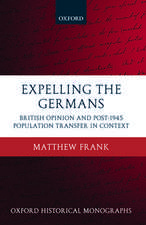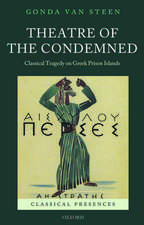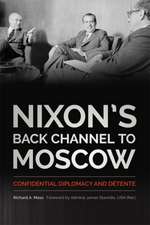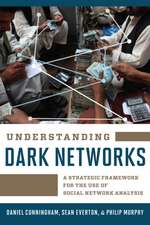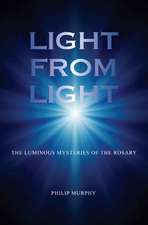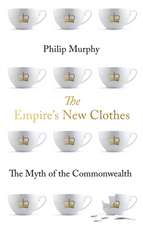Monarchy and the End of Empire: The House of Windsor, the British Government, and the Postwar Commonwealth
Autor Philip Murphyen Limba Engleză Paperback – 12 noi 2015
| Toate formatele și edițiile | Preț | Express |
|---|---|---|
| Paperback (1) | 309.67 lei 32-37 zile | |
| OUP OXFORD – 12 noi 2015 | 309.67 lei 32-37 zile | |
| Hardback (1) | 593.40 lei 32-37 zile | |
| Oxford University Press – 4 dec 2013 | 593.40 lei 32-37 zile |
Preț: 309.67 lei
Preț vechi: 352.97 lei
-12% Nou
Puncte Express: 465
Preț estimativ în valută:
59.25€ • 64.57$ • 49.93£
59.25€ • 64.57$ • 49.93£
Carte tipărită la comandă
Livrare economică 14-19 aprilie
Preluare comenzi: 021 569.72.76
Specificații
ISBN-13: 9780198757696
ISBN-10: 0198757697
Pagini: 258
Ilustrații: 2 maps, 16-page plate section
Dimensiuni: 159 x 235 x 15 mm
Greutate: 0.42 kg
Editura: OUP OXFORD
Colecția OUP Oxford
Locul publicării:Oxford, United Kingdom
ISBN-10: 0198757697
Pagini: 258
Ilustrații: 2 maps, 16-page plate section
Dimensiuni: 159 x 235 x 15 mm
Greutate: 0.42 kg
Editura: OUP OXFORD
Colecția OUP Oxford
Locul publicării:Oxford, United Kingdom
Recenzii
Professor Murphy's book by a country mile the most important and well-informed to have been written about the contemporary British monarchy
a carefully researched and beautifully presented book that chronicles the relationship between the monarchy, the UK government, and the decolonisation of the British Empire
Philip Murphy's book makes a strong case for the importance of analysing the role, self-image, and global perception of the monarchy in any book about British politics or foreign policy in the twentieth century ... an interesting, well-written, and extremely important contribution to the fields of British royal, political, imperial, and commonwealth history.
splendid
This is a solidly researched and well-argued book on a neglected subject that has the additional virtue of being entertaining. It deserves a wide readership.
Monarchy and the End of Empire is a traditional political study that examines in detail the dynamic relationships between and among the palace, Whitehall, and Commonwealth governments. This political focus is its greatest strength, as Murphy researches and writes this kind of history exceedingly well ... Murphy has thus provided not only a monograph that enriches and gives texture to our understanding of monarchy and Commonwealth but also one that demonstrates a need for more work on these topics, if we are to ever fully understand the process and results of decolonization.
a carefully researched and beautifully presented book that chronicles the relationship between the monarchy, the UK government, and the decolonisation of the British Empire
Philip Murphy's book makes a strong case for the importance of analysing the role, self-image, and global perception of the monarchy in any book about British politics or foreign policy in the twentieth century ... an interesting, well-written, and extremely important contribution to the fields of British royal, political, imperial, and commonwealth history.
splendid
This is a solidly researched and well-argued book on a neglected subject that has the additional virtue of being entertaining. It deserves a wide readership.
Monarchy and the End of Empire is a traditional political study that examines in detail the dynamic relationships between and among the palace, Whitehall, and Commonwealth governments. This political focus is its greatest strength, as Murphy researches and writes this kind of history exceedingly well ... Murphy has thus provided not only a monograph that enriches and gives texture to our understanding of monarchy and Commonwealth but also one that demonstrates a need for more work on these topics, if we are to ever fully understand the process and results of decolonization.
Notă biografică
Philip Murphy is Director of the Institute of Commonwealth Studies and Professor of British and Commonwealth History at the University of London. He graduated with a doctorate from the University of Oxford and taught at the Universities of Keele and Reading before taking up his current post. He has published extensively on twentieth century British and imperial history and the history of the British intelligence community. He is the author of Party Politics and Decolonization: The Conservative Party and British Colonial Policy in Tropical Africa 1951-1964 (1995) and Alan Lennox-Boyd: A Biography (1999), and the editor of British Documents on the End of Empire: Central Africa (2005). He is also co-editor of The Journal of Imperial and Commonwealth History.
